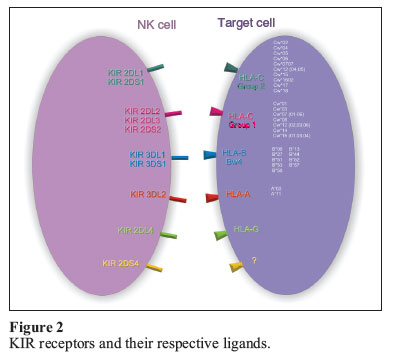Killer Immunoglobulin-like Receptor (KIR) genes express as receptors that activate or inhibit Natural Killer (NK) cells. The NK cells are part of the innate immune response and, through their KIR receptors, they identify target cells that have modified or different HLA (Human Leukocyte Antigen) molecules, inducing their lysis. The KIR receptors result from the expression of KIR genes (19q13.14) on the cell membrane of NK cells, which are polymorphic, and form haplotypes. The diversity of the frequency of KIR haplotypes in certain populations suggests that some individuals have different levels of protection against some diseases. The balance between cell inhibition and activation enables the NK cell to help the organism in immunological surveillance. In addition, there is evidence of the association of activating KIR genotypes with an increased risk for autoimmune disease
autoimmunity; KIR receptors; systemic sclerosis



